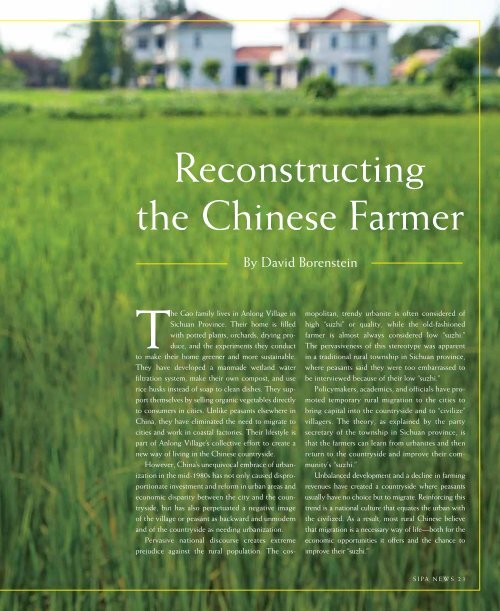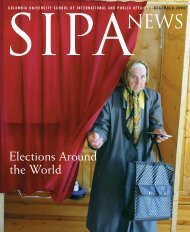SIPANewS - SIPA - Columbia University
SIPANewS - SIPA - Columbia University
SIPANewS - SIPA - Columbia University
Create successful ePaper yourself
Turn your PDF publications into a flip-book with our unique Google optimized e-Paper software.
Reconstructing<br />
the Chinese Farmer<br />
The Gao family lives in Anlong Village in<br />
Sichuan Province. Their home is filled<br />
with potted plants, orchards, drying produce,<br />
and the experiments they conduct<br />
to make their home greener and more sustainable.<br />
They have developed a manmade wetland water<br />
filtration system, make their own compost, and use<br />
rice husks instead of soap to clean dishes. They support<br />
themselves by selling organic vegetables directly<br />
to consumers in cities. Unlike peasants elsewhere in<br />
China, they have eliminated the need to migrate to<br />
cities and work in coastal factories. Their lifestyle is<br />
part of Anlong Village’s collective effort to create a<br />
new way of living in the Chinese countryside.<br />
However, China’s unequivocal embrace of urbanization<br />
in the mid-1980s has not only caused disproportionate<br />
investment and reform in urban areas and<br />
economic disparity between the city and the countryside,<br />
but has also perpetuated a negative image<br />
of the village or peasant as backward and unmodern<br />
and of the countryside as needing urbanization.<br />
Pervasive national discourse creates extreme<br />
prejudice against the rural population. The cos-<br />
By David Borenstein<br />
mopolitan, trendy urbanite is often considered of<br />
high “suzhi” or quality, while the old-fashioned<br />
farmer is almost always considered low “suzhi.”<br />
The pervasiveness of this stereotype was apparent<br />
in a traditional rural township in Sichuan province,<br />
where peasants said they were too embarrassed to<br />
be interviewed because of their low “suzhi.”<br />
Policymakers, academics, and officials have promoted<br />
temporary rural migration to the cities to<br />
bring capital into the countryside and to “civilize”<br />
villagers. The theory, as explained by the party<br />
secretary of the township in Sichuan province, is<br />
that the farmers can learn from urbanites and then<br />
return to the countryside and improve their community’s<br />
“suzhi.”<br />
Unbalanced development and a decline in farming<br />
revenues have created a countryside where peasants<br />
usually have no choice but to migrate. Reinforcing this<br />
trend is a national culture that equates the urban with<br />
the civilized. As a result, most rural Chinese believe<br />
that migration is a necessary way of life—both for the<br />
economic opportunities it offers and the chance to<br />
improve their “suzhi.”<br />
<strong>SIPA</strong> NEWS 23

















